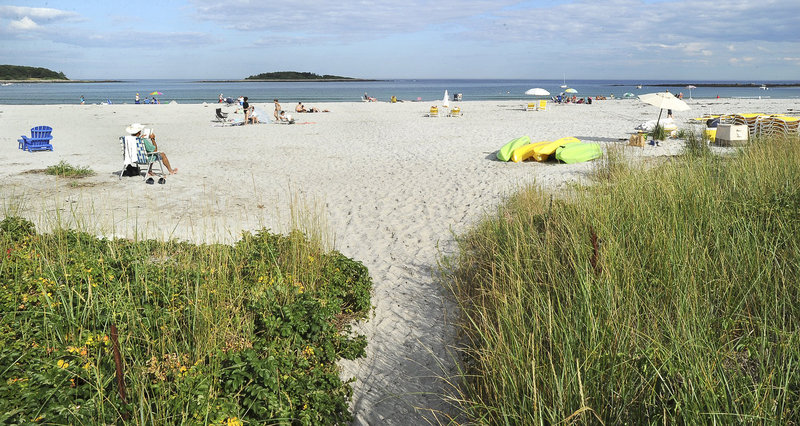PORTLAND – An ordinance that creates “reserved” areas for waterfront property owners at Kenebunkport’s Goose Rocks Beach went into effect Friday.
The beach-use measure, which won approval from town residents Monday, needed the owners of 50 of the 109 waterfront lots to agree to the terms in order to be valid. The owners of 62 waterfront lots had signed on and none had dropped out before Thursday’s opt-out deadline, according to Town Manager Larry Mead.
Adoption of the ordinance occurred with the town and a group of waterfront owners in the midst of a trial over property rights and access at the beach. The plaintiffs — owners of 29 waterfront lots — sued in 2009, arguing that the town violated their property rights by allowing public access to privately owned areas. The town maintains that the disputed areas are public.
Mead said that the beach-use measure takes pressure off the town and the public in terms of the trial. “Even if the judge rules against the town completely, most of the beach is still open to the public,” he said.
Non-participating lots are scattered along the length of the beach as none of the plaintiffs have signed the beach-use agreement.
The ordinance establishes a 25-foot-wide reserve area from a participating lot’s sea wall, or the edge of the landscaped area, toward the water. The public can walk in the area but property owners can ask them to leave.
If water covers part of the reserved area, the width of the reserved area would shrink to 10 feet for an hour before high tide until an hour after high tide.
Some aspects of the ordinance, such as the creation of an advisory committee to maintain the beach, will not be implemented until the spring, Mead said.
The trial, which is being held in Cumberland County Superior Court, was wrapping up its first week Friday. Three weeks have been scheduled for phase one, which focuses on public use of the beach. The second part of the trial, which will address claims to the land, has not yet been scheduled.
The state is involved as an intervenor in the case so it can argue for the public’s right to use the intertidal zone — the area between the mean high- and low-tide marks. A 1989 state supreme court case about Moody Beach in Wells struck down a law that asserted the public’s right to use that area for recreation.
The Goose Rocks Beach case provides a potential opportunity for the state supreme court to revisit that decision.
Kennebunkport had spent $750,000 in legal fees on the dispute as of July 1. Mead estimates that the total will reach $1 million by spring.
Staff Writer Ann Kim can be contacted at 791-6383, or at:
akim@mainetoday.com
Send questions/comments to the editors.


